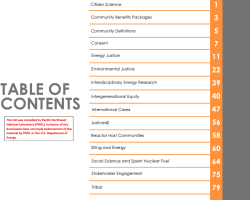Community Engagement and Nuclear Waste Siting Literature
Community Engagement and Nuclear Waste Siting Literature
Author(s)
Moore, Sharlissa
,
Fairchild-Grant, Ennea
,
Puente, Faridhe
,
Wasserman, Sherri
,
Holsen, Sonia
,
Cullen, Joy
Publication Date
This spreadsheet provides a list of documents that national laboratory staff found through a search of the literature on social and behavioral science and environmental justice issues related to spent nuclear fuel and nuclear waste. The review was conducted from 2022 to mid-2023. It sorts the references into themes identified in the table of contents. Papers that fit more than one theme may be listed in more than one section.

